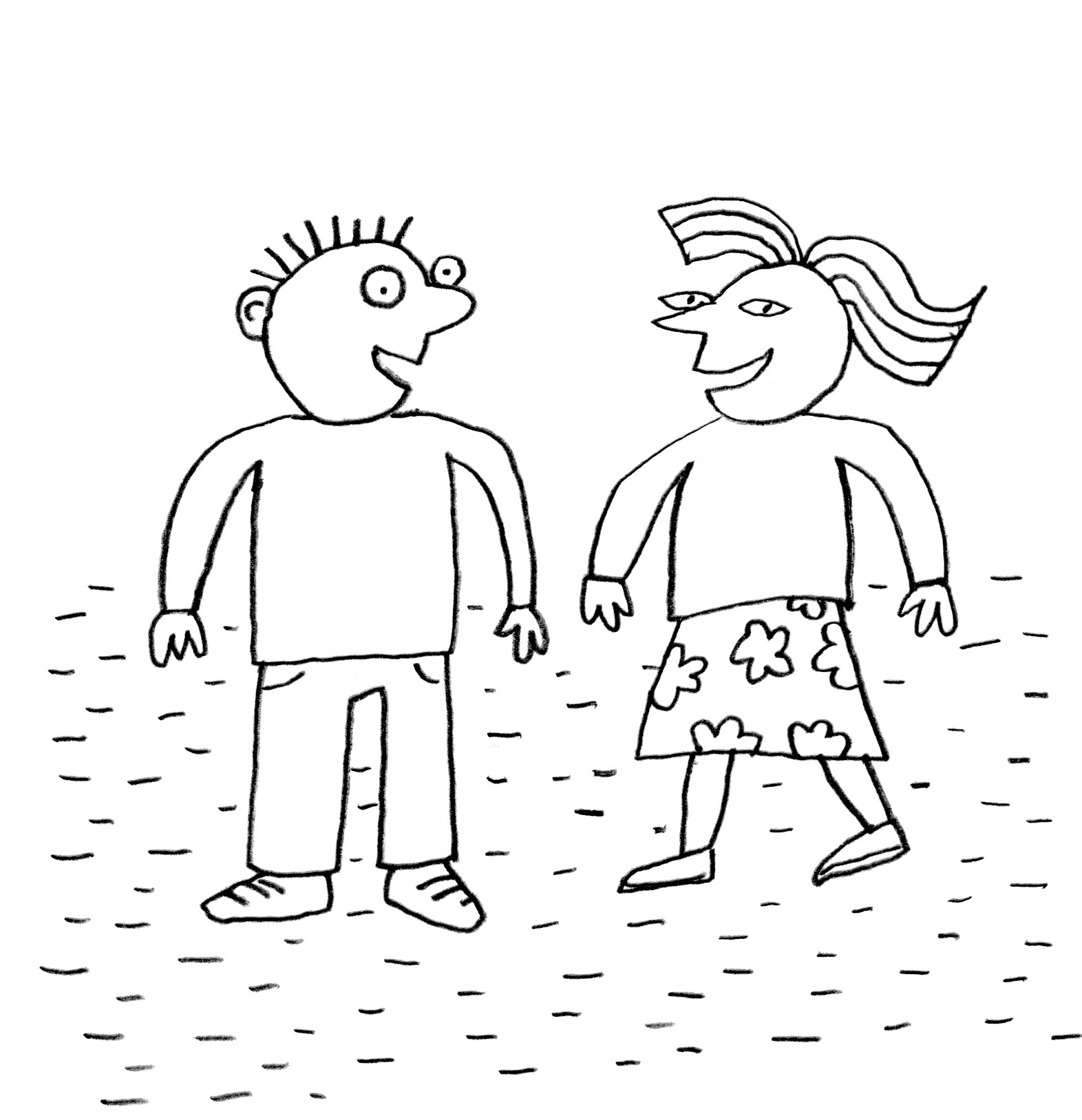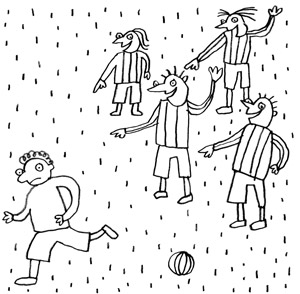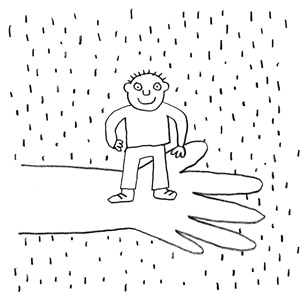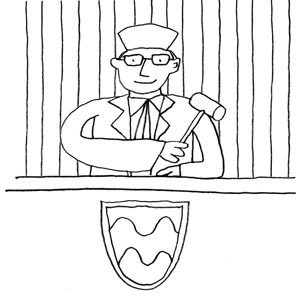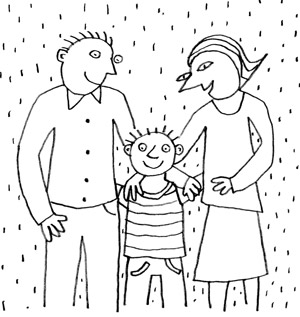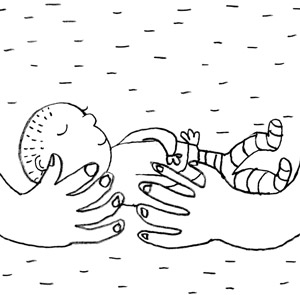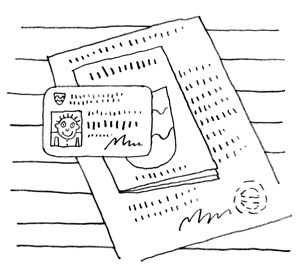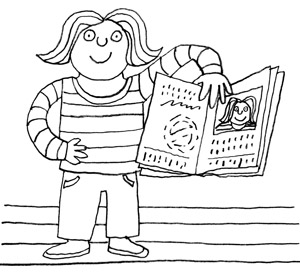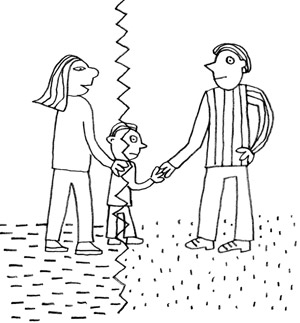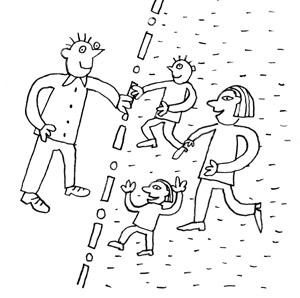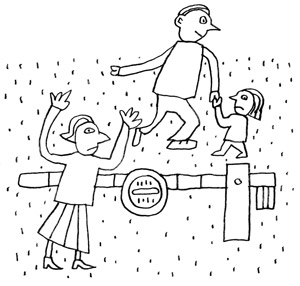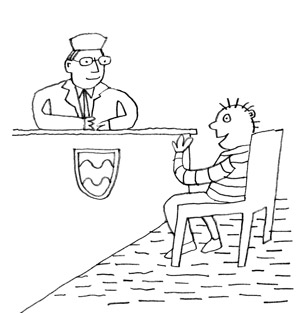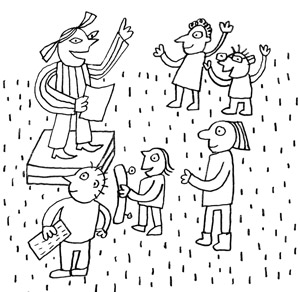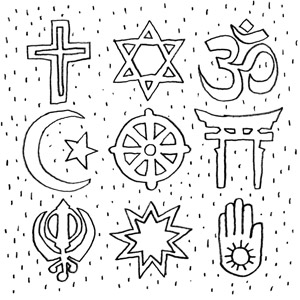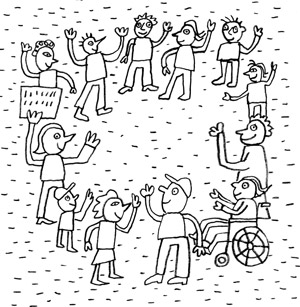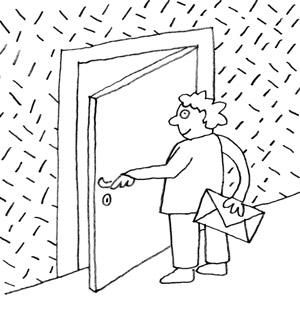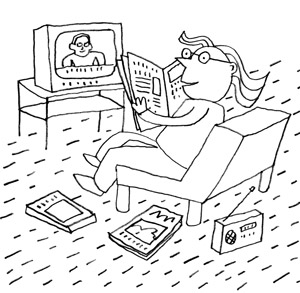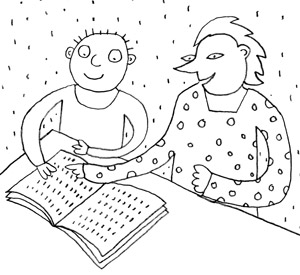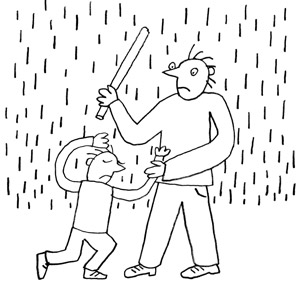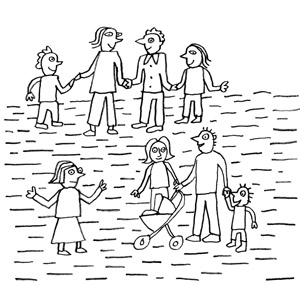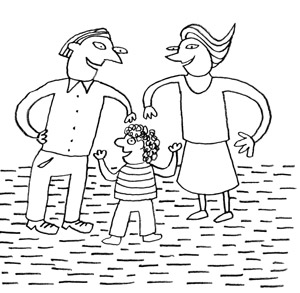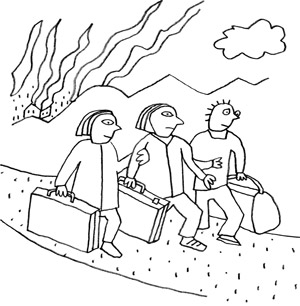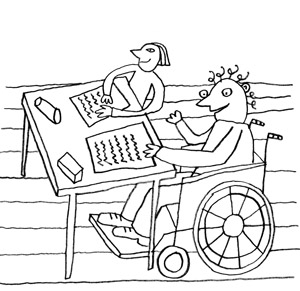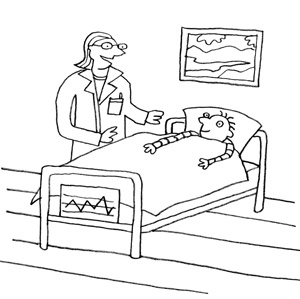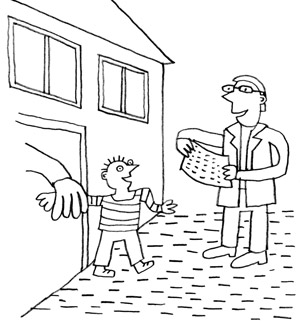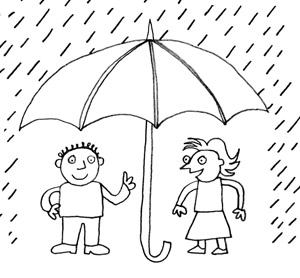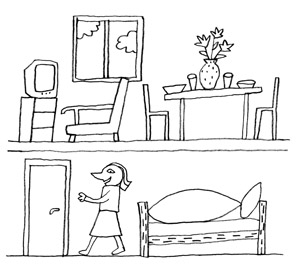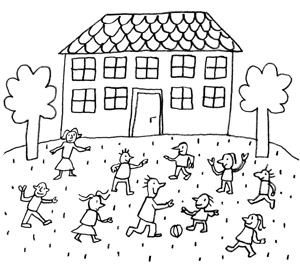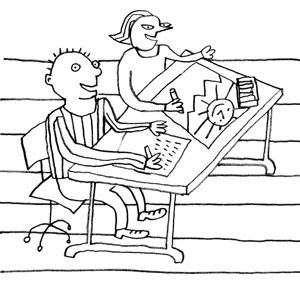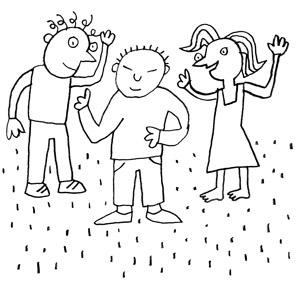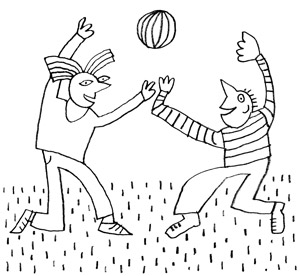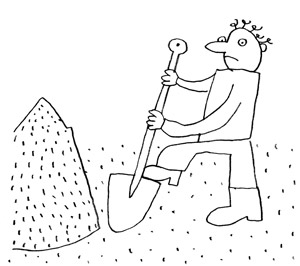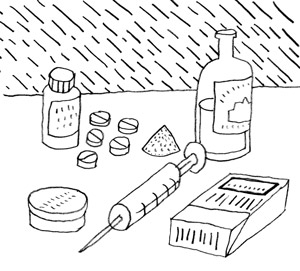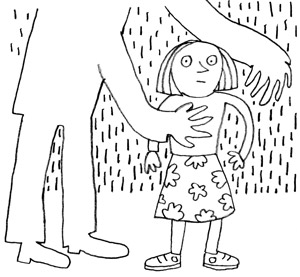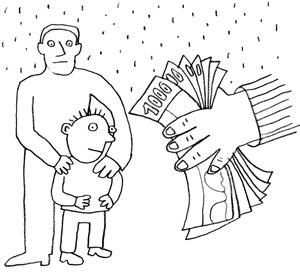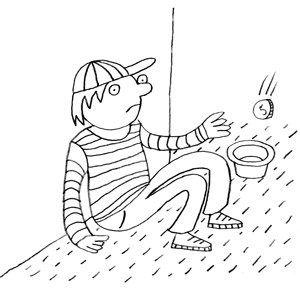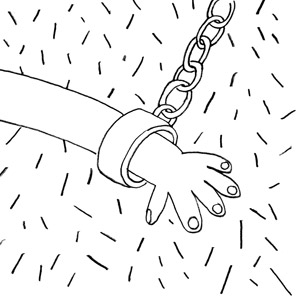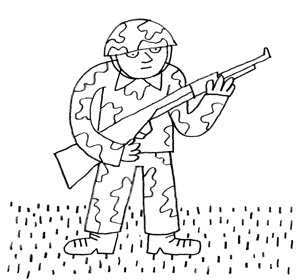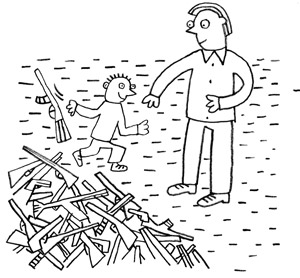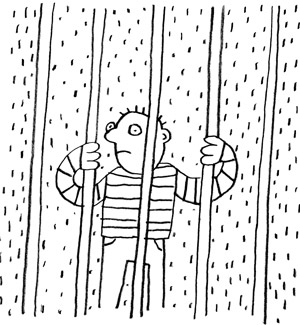4. The illustrated Children’s Rights (Children’s Rights cards)
Living Democracy » Textbooks » Exploring Children’s Rights » Part 3: Documents and Teaching Materials » 4. The illustrated Children’s Rights (Children’s Rights cards)In the beginning, children’s rights were first and foremost a judicial instrument. In the school context however it is clear that each article should be understood and interpreted from the perspective of the target group. The children’s rights cards help to reach the goal of developing understanding and application of these rights. The cards can be used in different ways. Here are some examples:
- The illustration and text can be cut out together and folded and glued to make double-sided cards. In this way flashcards can be created. Pupils can test themselves or each other.
- Illustration and text can be cut out to make memory cards. In this way, pupils can learn the children’s rights while having fun playing a game.
- Illustrations can be cut out to and ordered to various criteria:
- They can be grouped into the four criteria (participation: the right to participate; fulfilling our potential: the right to personal development; living well: the right to survival; protection from harm: the right to protection).
- They can be grouped into categories of personal values: What is important in my life? Which questions are relevant for my country, my community, my school?
- Illustrations and other cuttings from magazines, newspaper articles can be collected to illustrate similar themes.
- Pupils can gain inspiration from these illustrations and draw their own illustrations for the children’s rights.
- Illustrations can be enlarged and coloured in by the pupils (and perhaps framed afterwards). They can then be used to decorate classrooms and school corridors.
- Illustrations can be combined with short descriptions of personal experience and made into small brochures.
|
Article 1 |
Definition of the child A child is a person under 18 years of age.
|
|
Article 2 |
Non-discrimination No child should be discriminated against due to skin color, gender, language, religion, opinion, country of origin, poverty or wealth, disability or belonging to an ethnic minority.
|
|
Article 3 |
The well-being of the child is paramount In all laws and judicial decisions, the well-being of the child comes first.
|
|
Article 4 |
Implementation of rights Each state must ensure, to the best of its ability, that children’s rights are implemented.
|
|
Article 5 |
Respect of parental rights Each state is responsible for making sure that the duties, rights and responsibilities of parents are carried out in such a way as to ensure that children are free to exercise their rights. (Governments must respect the rights and duties of the parents, family members and/or legal guardians by informing and advising children about their rights). |
|
Article 6 |
Survival and development of the child Every child has the right to life and survival. The state must ensure that children and young people can develop well. |
|
Article 7 |
Name and state membership Every child has, from birth onwards, the right to a name, to state membership and to be cared for by their own parents. |
|
Article 8 |
Protection of identity Every child has the right to keep or to restore their name, state membership and family relations. |
|
Article 9 |
Separation of parents Every child has the right to live with his or her parents, apart from when they need to be protected from their parents. If a child must be separated from either or both of their parents, they have the right to be heard. If a child is separated from either or both of their parents, they have the right to know where they are. |
|
Article 10 |
Family reunification Every child has the right to leave each state and travel to their own country in order to be reunified with their family. |
|
Article 11 |
Protection from kidnapping and abduction Every state must fight against kidnapping and abduction to another country and non-return of children by a parent or another person. |
|
Article 12 |
The child’s freedom of opinion Every child has the right to be heard and to express their opinion on all questions and matters relating to their life. This is particularly valid in legal or administrative processes. The older the child, the more their opinion should be listened to. |
|
Article 13 |
Freedom of expression Every child has the right to express their opinion freely and to obtain and disseminate information through the media. Every child also has the responsibility to express their opinion in such a way as to respect the rights of others. |
|
Article 14 |
Freedom of thought, conscience and religion Every child has the right to freely practice their religion and freely exercise their thought and conscience. The state must respect the rights and responsibilities of parents when children implement these rights. |
|
Article 15 |
Right to peaceful public gathering Every child has the right to gather together with other children, to join or found an association or union, as long as the rights of others are not injured in the process. |
|
Article 16 |
Protection of privacy Every child has the right to not have anyone interfere with their private life, family, dwelling or written exchanges. In addition, every child has the right to not have anyone damage their honour. |
|
Article 17 |
Access to appropriate information Each state must ensure that children have access to information through various forms of media and that they can acquire knowledge that is important for their well-being. The state also has the duty to protect kids from damaging information. |
|
Article 18 |
Responsibility of parents Parents or guardians are jointly responsible for the upbringing of the child. The state has the responsibility to support them in this and, for example, to make childcare available should the parents need to work. |
|
Article 19 |
Protection from abuse The state is responsible for protecting the child from abuse by parents or other people. Every child has the right to learn how to avoid or deal with every form of abuse. |
|
Article 20 |
Young people without families Every child that doesn’t live with their family, has the right to special protection and support. They then have the right to a foster family or care in an appropriate institution that is considerate of their religious, cultural or linguistic background. |
|
Article 21 |
Adoption A child can be adopted if adoption is authorized, recognized and approved by the country and if it serves the well-being of the child. |
|
Article 22 |
Refugee children Every child who is forced to leave their country, who is a refu¬gee and seeking asylum, has a right to special protection by the state. |
|
Article 23 |
Disabled children Every child with a disability has a right to special care and education. They should be helped to be independent and to participate actively in their communities. |
|
Article 24 |
Health and medical services Every child has the right to the best possible medical care. The state has the duty to combat child mortality, to ensure medical provisions for young people, to combat poor diet and illness, to guarantee medical care for pregnant women and young mothers, to make accessible health education, to develop prevention in the public health sector and to abolish customs that harm children. |
|
Article 25 |
Review of treatment or care Every child that has been admitted to an institution for their protection, care or treatment has the right to have their admission checked and reviewed. |
|
Article 26 |
Social security Every child has the right to social security such as a social in¬surance. The state guarantees the child payments which take into consideration the financial situation of the family or carers. |
|
Article 27 |
Standard of living Every child has the right to a standard of living appropriate to their physical, spiritual, moral and social development. The parents or guardians are above all responsible for ensuring this. The state has the duty to support them in this. |
|
Article 28 |
Education Every child has the right to an education and to school. The state has the duty to make primary education free and obligatory and similarly to make secondary education accessible to all children and young people. The state has the duty to ensure that children and young people are treated appropriately at school and that their human rights are not infringed upon. |
|
Article 29 |
Educational aims School education should develop each child’s personality and talents, prepare each child for adult life and should encourage children to respect human rights and their own and other cultures and values. |
|
Article 30 |
Children of minorities Every child belonging to a minority has the right to learn about and practice their own culture, religion and language. |
|
Article 31 |
Rest, play and free time Every child has the right to rest and free time in which they can play and participate freely in cultural and artistic life. |
|
Article 32 |
Child labour Every child has the right to be protected from every form of exploitation and work that could damage their education or development. The state has the duty of determining a minimum age for the permission to work, the amount of hours per day and working conditions. |
|
Article 33 |
Protection form narcotic drugs Every child has the right to be protected from the production and trade of illegal drugs. |
|
Article 34 |
Protection form sexual exploitation Every child has the right to be protected from sexual exploitation and abuse and from prostitution and pornography. |
|
Article 35 |
Protection from sale and trafficking The state must undertake everything within its power to ensure that children and young people are not abducted or trafficked. |
|
Article 36 |
Protection from all other forms of exploitation Every child has the right to be protected from all other forms of exploitation (e.g. begging). |
|
Article 37 |
Torture and imprisonment Every child has the right to protection from torture, cruel treatment or punishment, illegal arrest or any other forms of injury to their personal freedom. The state has the duty to prohibit the death penalty and life imprisonment for young people. If a child is imprisoned, they have the right to humane and respectful treatment. If a child or young person is arrested, they must not be held in confinement with adults, be able to keep in contact with their families and have the right to legal assistance. |
|
Article 38 |
War and armed conflict Children and young people under 15 years of age have the right to not take part in war and armed conflict. The state has the duty to grant special protection to children who are affected by war. |
|
Article 39 |
Rehabilitation and integration Every child who is the victim of armed conflict, torture, neglect or exploitation has the right to appropriate care to enable them to become mentally and physically healthy and to be integrated in a community. |
|
Article 40 |
Juvenile justice Every child accused of committing a crime has the right to be treated with dignity in court. They are innocent until proven guilty. Every child has the right to a fair trial, an interpreter (if needed), the protection of their privacy and to have a court decision re-examined. The state has the duty to set a minimum age below which children cannot be held criminally responsible. The state also has the duty to provide alternatives to imprisonment for convicted children and young people. |
